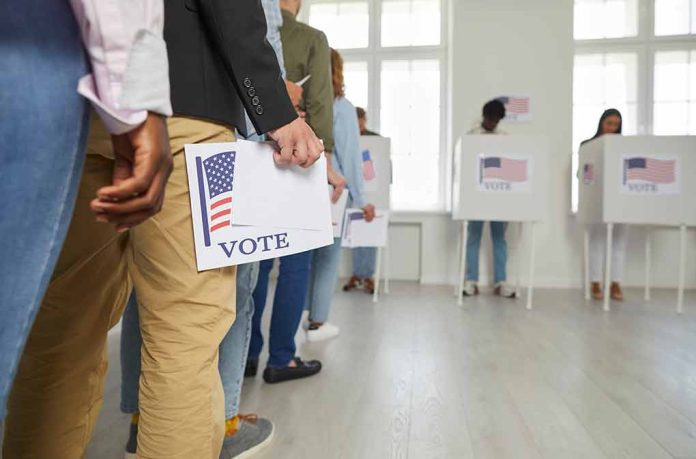
As the 2024 presidential election approaches, Republicans intensify legal efforts to revise voting laws in key battleground states, potentially impacting ballot casting and election outcomes.
At a Glance
- Republicans have filed over 100 lawsuits challenging various aspects of the voting process
- Key battleground states like Arizona, Georgia, and Michigan are at the center of legal battles
- Changes in voting laws could influence the election outcome in closely contested states
- Both parties are preparing for potential post-election legal challenges
Republican Legal Strategy Intensifies
The Republican Party has significantly ramped up its legal efforts to challenge and revise voting laws across key battleground states as the 2024 presidential election draws near. The GOP and Republican lawmakers have filed over 100 lawsuits targeting various aspects of the voting process, including mail-in voting regulations, voter identification requirements, ballot counting procedures, early voting access, and absentee ballot deadlines.
These legal challenges are particularly focused on swing states that could determine the outcome of the election. Arizona, Georgia, Michigan, Nevada, North Carolina, Pennsylvania, and Wisconsin are at the forefront of these battles, with each state facing unique changes and challenges to their voting laws.
Republicans have filed numerous lawsuits to challenge voting laws and practices before the November election. https://t.co/LwEVC9OSGw
— NEWSMAX (@NEWSMAX) September 30, 2024
Battleground State Changes
In Georgia, a 2021 law limits mail-in ballot requests, reduces drop boxes, and restricts unsolicited mail-in ballot applications. North Carolina has implemented new laws that shorten mail-in ballot deadlines and enforce voter ID requirements. Arizona has reduced the time allowed for correcting absentee ballot signatures.
“The last four years have been a long, strange trip,” said Hannah Fried, co-founder and executive director of All Voting is Local, a multistate voting rights organization. “Rollbacks were almost to an instance tied to the ‘big lie,'” she added, referring to Trump’s election conspiracy theories. “And there have been many, many positive reforms for voters in the last few years that have gone beyond what we saw in the COVID era.”
On the other hand, some states have expanded voting access. Michigan has introduced nine days of early voting and established a permanent vote-by-mail list. Nevada has transitioned to a universal vote-by-mail system, which has seen high voter participation.
Potential Impact on Voters
The outcomes of these legal challenges could have far-reaching consequences for voter participation. There are concerns about potential voter confusion due to last-minute court decisions, increased strain on election officials, and possible reductions in voter turnout. Additionally, if litigation extends beyond November 5, there could be delays in determining election results.
“Any voter that is affected unnecessarily is too many in my book,” said an election official, highlighting the importance of clear communication and voter education to mitigate confusion arising from ongoing litigation and legislative changes.
As the election approaches, both major parties are gearing up for potential post-election legal battles. The Republican National Committee has deployed over 165,000 volunteers for poll monitoring, emphasizing “election integrity.” Democrats are countering with their own “voter protection” efforts, including staffers, lawyers, and volunteers to challenge GOP cases.
Looking Ahead
The close margins expected in key states mean that court rulings on ballot legitimacy could play a decisive role in determining the outcome of the 2024 presidential race. As both parties prepare for potential challenges, the focus remains on ensuring a fair and transparent election process while navigating the complex landscape of state-specific voting laws and regulations.
Sources:
- In the tightest states, new voting laws could tip the outcome in November
- Republicans lay legal groundwork for election challenges
- GOP lawsuits set the stage for state challenges if Trump loses the election
- GOP asks court to change voting rules in one state, with impact for all
- Republicans are suing more election officials over voter rolls in several battleground states
- GOP-led election lawsuits pile up ahead of November contests






